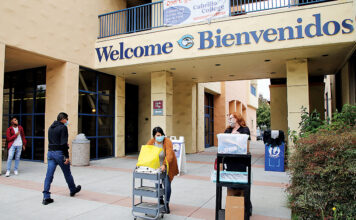Jurisdictions throughout the U.S. have imposed shelter-in-place orders for their residents in an attempt to slow or stop the spread of coronavirus, casting into doubt nearly all day-to-day activities.
So what is and is not allowed under the order?
Grocery stores and other retail businesses that sell food are considered essential services, and are exempt from the order. Anyone is allowed to leave their homes to get food for their households.
It is, therefore, unnecessary to hoard food, toilet paper and other essentials.
Most restaurants will be open on a limited basis to provide carry-out food.
Other essential activities:
• Filling a prescription, taking a pet to the veterinarian, buying medical supplies.
• Visiting a “healthcare operation,” which is a broad category that includes hospitals, dentists and pharmacies. Gyms and fitness facilities are not included, and most have been temporarily closed.
• Engaging in outdoor activities such as walking, biking and running, while staying at least six feet from other people
• To work providing essential services. Emergency workers, firefighters and police officers are categorically exempt from the order.
• Caring for family members in another residence.
• Working in an essential service, including public works, construction of housing, airport operations and infrastructure such as water, sewer, gas, roads, electricity, public transportation and solid waste removal.
• Working in telecommunications businesses such as telephone and internet providers.
Essential businesses
• Grocery stores, farmers markets, food banks, convenience stores and other retail businesses that provide food.
• Farming, livestock and fishing.
• Providing food, shelter and other services for economically disadvantaged people.
• Media services such as newspapers, television and radio.
• Gas stations, auto supply and auto repair.
• Hardware stores.
• Plumbers, electricians, exterminators and other service providers that are necessary to maintain households, as well as essential businesses and services.
• The U.S. Post Office and other mailing services.
• K-12 schools, colleges and universities to deliver distance learning services.
• Laundromats and dry-cleaners.
• Restaurants, for carry-out and delivery only.
• Businesses that supply products needed for people to work from home.
• Businesses that deliver groceries, food, goods and services directly to residences.
• Airlines, taxis and other private transportation services.
• Home-based care for children and seniors.
• Home-based care and residential facilities for children, adults and seniors.
• Professional services such as legal and accounting, when necessary for legally mandated requirements.
• Childcare facilities, if there are 12 or fewer children.











